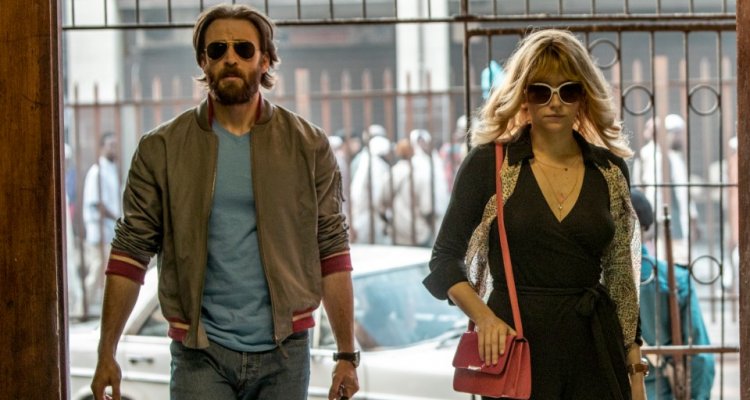If the silver screen has one true love, it’s the transformation of tough real-life events into entertaining escapades. Sometimes, it works well. Films like “Argo” treat their source material respectfully, taking distressing true stories and making thoughtful, digestible features from them. As authentic characters place themselves in peril, narrowly dodging one life-threatening jam after another, audiences watch aghast, wondering, “Would we be as courageous?”
Other times, it doesn’t work at all. “The Red Sea Diving Resort” is such an example, and that’s likely why it turned up on Netflix with little fanfare. A decade after his sophomore feature “Train” (a fair-to-middling gorefest starring erstwhile Hollywood darling Thora Birch), Gideon Raff returns with this overdone spy drama. Possibly led by nobler intentions, the Israeli writer-director ends up cashing in on the mettle of those involved in a bold rescue mission, tweaking a terrifying reality until it resembles little more than a banal thriller.
Inspired by actual events, “The Red Sea Diving Resort” traces the covert ‘Operation Brothers’ in early ‘80s Sudan. A team of undercover secret service agents come together to spruce up the eponymous deserted beachside holiday resort and open its doors to real, paying tourists. Of course, it’s all a clever smokescreen for sneaking thousands of Ethiopian Jewish refugees out of the hostile country and off to the safety of Israeli soil. Under the cover of darkness, while holiday-makers rest in their slumber, the refugees are smuggled through the hotel – and in the Sudanese authorities’ blissful ignorance.
All the making of high-drama, huh? Well, right out of the gate, it seems so. As a group of frightened Ethiopians clamber aboard a truck to the unsettling sputter of distant gunfire, we’re lured into a faux hope of “Argo”-style tension and suspense. But as Raff trudges on, one humdrum scene after another, his weak, exploitative treatment of this true story washes it out. The movie might offer a righteous hero in free-spirit Ari Levinson (Chris Evans), but the guy reeks of the sort of egotism intrinsic to the savior complex. In fact, his unyielding compulsion to help beleaguered souls came at the price of a wife and child.
This wouldn’t be so egregious if Evans weren’t given the lead, bringing to work the whole virtuous, strong-chinned superhero vibe he’s perfected during his Marvel adventures. That, coupled with the unrealistically simplified, hammy dialogue Raff chucks the good-guy actor’s way, merely gives us a bearded Captain America, staring earnestly through aviators, sporting snazzy coats – when he’s concerned with wearing clothes – and uttering hollow statements feebly grasping at profundity.
Ari musters a disparate five-man crew of fellow altruists, including womanizer Jake Wolf (Michiel Huisman) – who flashes his butt, for anyone interested – and introverted cynic Sammy Navon (Alessandro Nivola) among others. And Ben Kingsley pops up as Ethan Levin, his dapper English gaffer – cut-class accent, pocket square, and all – keen to put the kibosh on the entire operation.
Nonetheless, the creative and potentially reckless scheme presses on. At first, as Ari and Co. put the resort together to Duran Duran’s Hungry Like the Wolf, the cheery choice of song is baffling. Raff soon reveals his crafty aim is to put his audience at ease before slapping us in the face with the harsh, dangerous realities of Sudan’s political climate at the time. Sadly, his ploy nosedives. The filmmaker hadn’t considered we’d be close to REM sleep by then, so all he really does is rouse us from our ennui and despair with a pile of Ethiopians being rounded up, questioned about their shrinking population, and shot in the head when they refuse to answer. Many look on, unflinching– which is just oddly implausible – while others stand, eyes down, understandably quivering in terror.
Sure, that’s the reaction you’d expect of anyone under comparable adverse circumstances, but it’s how Raff chooses to represent the Ethiopians throughout. And that’s not OK. He infrequently permits them the dignity of being portrayed as anything other than a pack of scared, howling animals in need of shepherding. As if this isn’t embarrassing enough for the writer-director – given his spirited glorification of Ari and his merry band of do-gooders – he plumps for almost every character cliché in the thriller handbook all over the show. And do we buy into any of them? Not one iota.
Nobody’s arguing the real people these characters are based on shouldn’t be revered. Quite the opposite. But this is a dramatization of events. By definition, it needs the excitement of drama and the compelling nuances of people to succeed like “Argo” and other movies recreating history. Raff saw an opportunity with this tale, took it, and didn’t bother to do it justice. That’s pretty much all there is to say. [C-]

